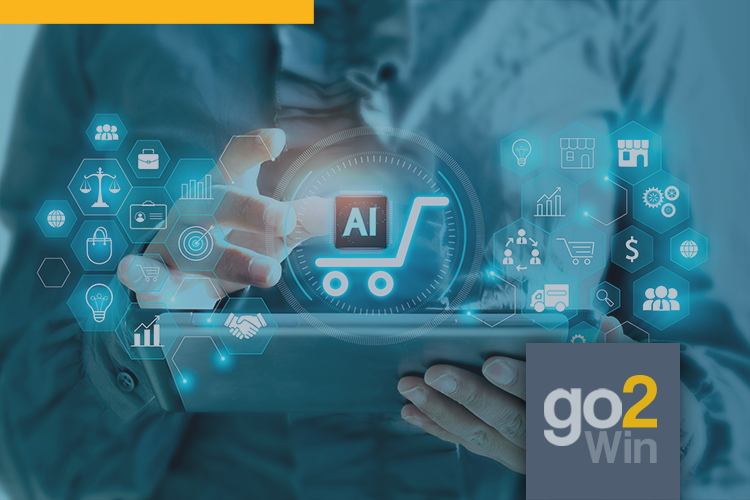Driven by the evolution of innovative Artificial Intelligence (AI) technologies, e-commerce has advanced at a dizzying rate in recent years. In this scenario, generative AI (GenAI), with its potential to create original content, anticipate trends and personalize interactions with consumers, among other features, has been standing out as an essential tool for companies in the face of constant transformations in the sector.
In this article, we will explore some applications of this innovative AI model in e-commerce and the benefits it provides to companies in this segment — in addition to the challenges to implementing it successfully.
Concept and applications
Generative AI uses advanced neural networks such as Generative Adversarial Networks (GANs) and Large Language Models (LLMs) to generate original content that simulates patterns and styles found in large data sets. Unlike traditional algorithms that analyze and classify data, this capability enables the creation of personalized content, predict consumer trends, and improve the customer experience.
Applications
The main applications of GenAI in e-commerce are:
- Personalized content generation
Generative AI can create personalized product descriptions, ads, and even marketing emails, and use historical data about customer behavior to adapt the tone and style of messages for each audience segment — thereby increasing the chances of conversion.
- Creating images and videos
GANs make it possible to create images of products in different scenarios — or even generate images of new items based on initial concepts. It is worth noting that this feature is very useful for e-commerces in segments in which goods must be presented in different environments, such as fashion or decoration.
- Chatbots and Customer Service
Another feature of GenAI is its ability to provide information and respond to customer queries in a natural, personalized, human-like manner through advanced chatbots . This can reduce waiting times and provide a better customer experience.
- Product recommendations and trend anticipation
Another essential application is the analysis of browsing and shopping data to suggest products more accurately. Generative AI can also predict trends and changes in consumer preferences, allowing companies to adjust their inventory and, if necessary, anticipate marketing campaigns.
- Code simulation and interface testing
In the case of e-commerce companies that invest in innovation, this technology can be used to generate codes and even simulate user interfaces, an essential aspect for simplifying the creation of more intuitive and optimized websites.
Benefits
Among the benefits that the adoption of generative AI offers to the e-commerce sector, the following stand out:
- Personalization at scale
You can personalize each customer’s experience, from product recommendations to content displayed in marketing campaigns, to create a more relevant, enjoyable shopping experience with the potential to increase customer retention and conversion rates.
- Agility in content creation
Generative AI automates the process of creating product descriptions, ads, social media content, and more, freeing up time and resources for marketing teams to focus on strategic tasks.
- Reduction of operational costs
Automating tasks such as customer service and content generation significantly reduces operational costs. Another major advantage in this regard is the ability to test different strategies quickly and efficiently.
- Higher quality in customer service
Applying GenAI to chatbots allows for more natural and personalized customer service. Virtual assistants can then provide more assertive responses to consumers by identifying their specific needs, providing a much more pleasant and satisfying shopping experience.
- Anticipating trends and demand
By analyzing large volumes of data, it is possible to anticipate consumption trends and, in this way, optimize inventory management by adjusting stocks to avoid a lack of popular products — or an excess of items with low demand.
Challenges
Although generative AI offers many advantages and benefits, its implementation brings some challenges. For example:
- Data quality
Successful implementation of GenAI relies heavily on the use of high-quality data. This means that incomplete, outdated, or inaccurate data can lead to incorrect predictions or content creation that does not match the customer profile — all of which can compromise the effectiveness of marketing campaigns.
- Privacy and security
As personalization in e-commerce increases, the use of large volumes of customer data raises important privacy and security concerns. To ensure that this information is properly protected — and used ethically and legally — it is crucial that e-commerce companies adopt robust cybersecurity practices and comply with data protection laws and regulations, such as the LGPD.
- Implementation and maintenance costs
Implementing and maintaining generative AI solutions requires significant investments in technology and training. In addition to the high initial cost, it is essential to consider the need to continually invest in specialized teams to manage the AI models and keep them updated — an aspect that can be challenging especially for smaller companies.
- Risks of inappropriate content
Even with so many advantages, it is important to note that generative AI still has limitations when it comes to controlling the content generated — which may be inappropriate or reflect an image that the company does not want. In other words, this means that it is crucial to ensure the quality and consistency of these texts through rigorous review and validation processes.
- Adjusting expectations
Implementing GenAI requires a period of adaptation, learning, and constant refinement. Therefore, to achieve consistent results aligned with business expectations, it is necessary to develop a solid base of quality data, in addition to defining and calibrating the technology’s performance parameters over time. However, this process involves frequent adjustments and updates to ensure real value is delivered. In this sense, it is essential that organizations establish realistic expectations regarding the intended objectives, and understand that the path to accuracy and consistency requires patience, planning, and dedicated resources.
Connection and efficiency
By enabling closer and more personalized interactions, generative AI significantly increases efficiency in the e-commerce sector, in addition to making it more dynamic and helping to strengthen the connection between brands and consumers. The use of this technology therefore offers an invaluable competitive advantage — and enables the development of advanced personalization strategies, which enable differentiated experiences to precisely meet customers’ expectations, demands and desires.

